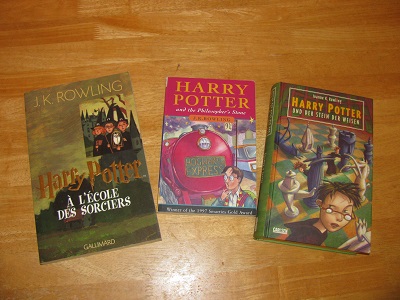It’s time for Sonderling Sunday, that time of the week when I play with language by looking at the German translation of children’s books.
I’ve recently begun corresponding with a man on a dating site whose first language is French. So I’m thinking it’s time to brush up my French. That means this week I’m looking at the one book I have in German and English and French — Harry Potter and the Philosopher’s Stone, Harry Potter und der Stein der Weisen, Harry Potter à l’École des Sorciers.
Note: I’m using the British edition, since that’s the original. I just noticed that there was a difference with one word I translated. Dudley’s first word, “Shan’t!” was “Won’t!” in the American edition.
Last time I looked at these three books, I left off on page 10 in the British edition, page 9 in French, and page 10 in German.
I’ll start with “the last report on the evening news”
= la fin du journal télévisé
= das Neueste in den Abendnachrichten (love those German long words!)
“bird-watchers”
= Vogelkundler
(The French version doesn’t use this word, just talks about “testimonials” = témoignages, but doesn’t say who gave them.)
Another nice long German word:
(British): “the news reader”
(American): “the newscaster”
= der Nachrichtensprecher
= le présentateur
“downpour of shooting stars”
= ganze Schauer von Sternschuppen
= de véritables pluies d’étoiles filantes
“Perhaps people have been celebrating Bonfire Night early — it’s not until next week, folks!”
= Peut-être s’agissait-il de feux de joie, bien que ce ne soit pas encore la saison. (“Perhaps it was fires of joy [bonfires], but it was not yet the season.”)
= Vielleicht haben die Leute zu früh Silvester gefeiert — das ist noch eine Weile hin, meine Damen und Herren!
(“Perhaps people have too early New Year’s Eve celebrated [when Germans really do shoot off fireworks] — that is still a while yet, my ladies and gentlemen!”)
I like this sentence, in each language:
“Mr Dursley sat frozen in his armchair.”
= Mr Dursley se figea dans son fauteuil.
(“Mr. Dursley froze in his chair.”)
= Mr. Dursley saß starr wie ein Eiszapfen in seinem Sessel.
(“Mr. Dursley sat stiff as an icicle in his chair.”)
“Owls flying by daylight?”
= Eulen, die bei Tage flogen?
= Des hiboux qui volent en plein jour?
“Mysterious people in cloaks all over the place?”
= Des gens bizarres vêtus de capes?
= Allerorten geheimnisvolle Leute in sonderbarer Kleidung?
(Ah! An appearance where sonder means “special” in the sense of “strange.”)
“It was no good.”
= Es hatte keinen Zweck. (“It had no point.”)
= Décidément, il y avait quelque chose qui n’allait pas.
(“Decidedly, there was something wrong.”)
“her lot”
= ihrem Klüngel
= sa bande
“Mrs Dursley sipped her tea through pursed lips.”
= Mrs Dursley retroussait les lèvres en buvant son thé à petites gorgées.
(“Mrs Dursley curled her lips drinking tea in little sips.”)
= Mrs. Dursley nippte mit geschürzten Lippen an ihrem Tee.
“Was he imagining things?”
= Bildete er sich das alles nur ein?
= Mr Dursley imaginait-il des choses?
“His last, comforting thought before he fell asleep”
= Bevor er einschlief, kam ihm ein letzter, tröstender Gedanke
(“Before he fell asleep, came to him a last, comforting thought”)
= La seule pensée qui le consola avant de sombrer enfin dans le sommeil
(“The only thought that consoled him before finally falling asleep”)
“How very wrong he was.”
= Wie sehr er sich täuschte.
= Et il avait grand tort de penser ainsi.
There. I’ve gotten us finished with the Dursleys for now. The next scene will involve Albus Dumbledore and Professor McGonagall.
It’s fun to see how the German and French translators differ, and now you know what to call it if you see Des gens bizarres vêtus de capes or geheimnisvolle Leute in sonderbarer Kleidung.

Thank you! I’m finding it oddly validating that sometimes the French is longer than the German.